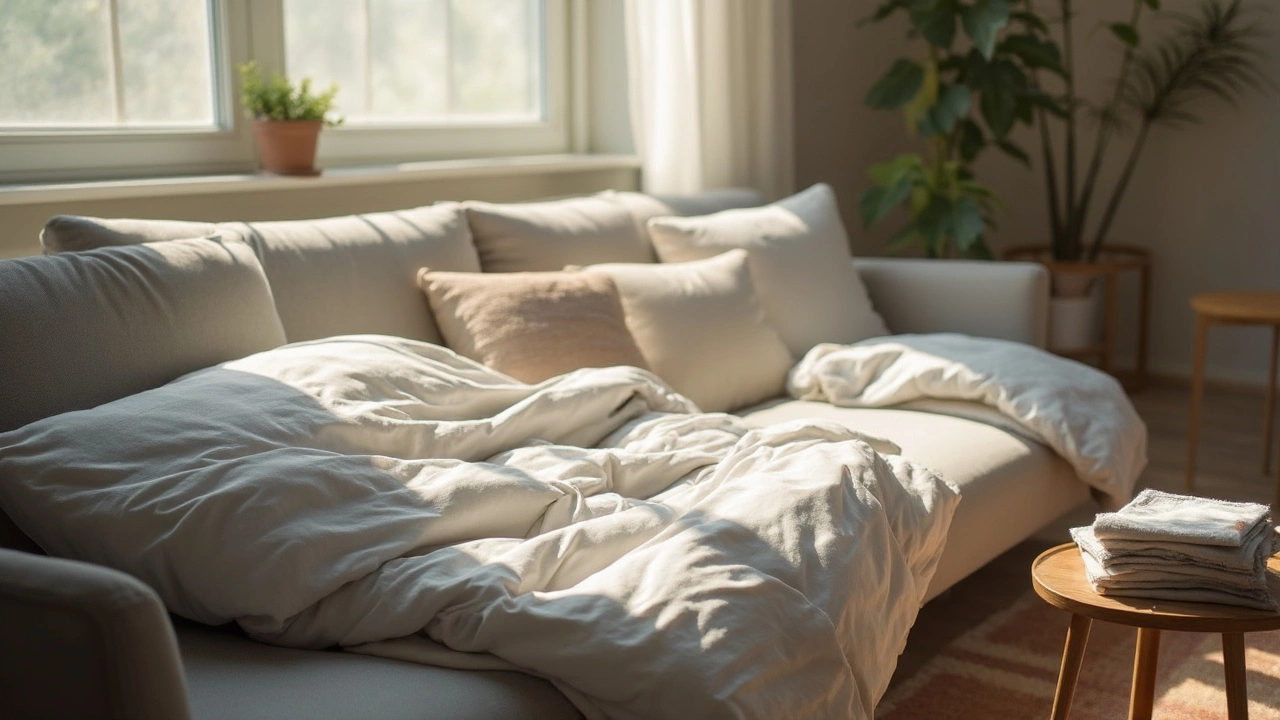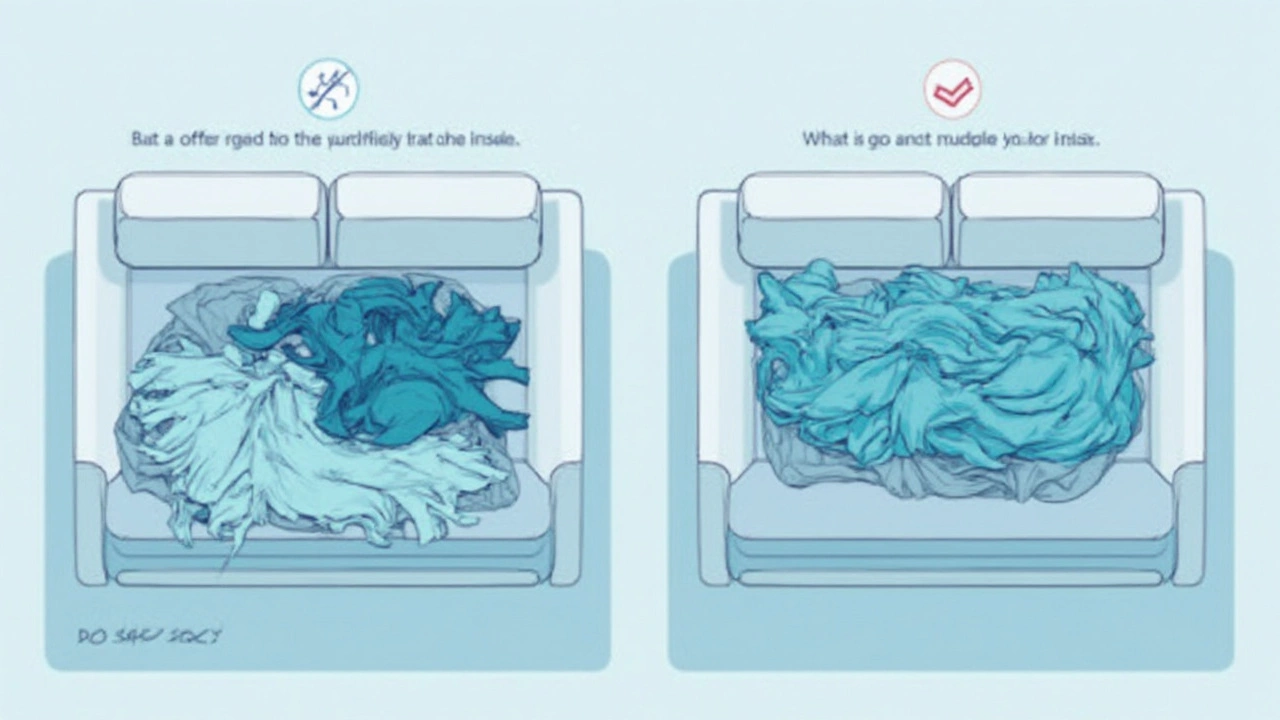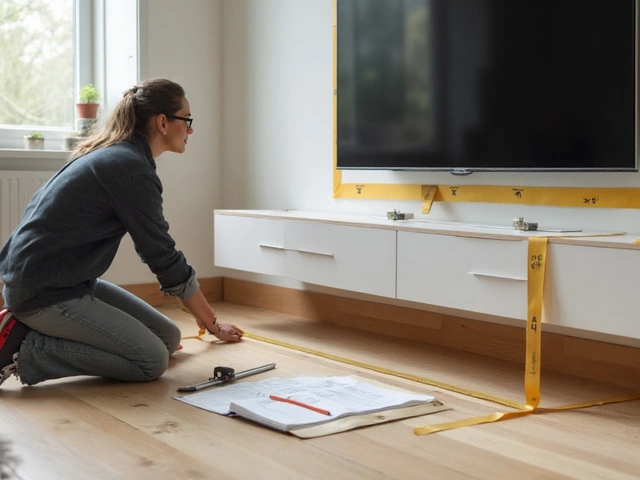
Ever tried folding up a sofa bed and wondered if you could just leave the bedding inside instead of wrestling with it every night? You’re not alone. Most people want an easy setup and don’t love stuffing blankets and pillows into random closets.
But here’s the catch—whether you can leave your bedding on a sofa bed depends on the type of sofa bed and the kind of bedding you use. Some modern designs actually have extra space for thin sheets and maybe a light blanket. Others will jam or get stuck if you try leaving anything more than a fitted sheet. And yeah, there are a few common problems that can pop up, but there are ways to dodge the worst ones.
If you’re tired of the hassle or just want your living room to look less cluttered, let’s get into how to make your sofa bed work for real life (and not just for showrooms).
- Why You May Want to Leave Bedding On
- Types of Sofa Beds: What Works and What Doesn’t
- Mess, Smells, and Wear: What to Watch Out For
- Tidy Tricks: Smarter Sofa Bed Habits
Why You May Want to Leave Bedding On
If you’ve ever slept on a sofa bed, you know the deal: nobody likes making and unmaking a bed every single night—especially in a tight apartment or if the sofa is in the living room, right in the middle of everything. The urge to just leave your sheets and blanket where they are comes from wanting things to be quick, easy, and not messy.
Most people who use sofa beds daily or have guests often say the same thing. Saving time is the big one. In fact, according to a small 2023 online survey from Apartment Therapy, almost 60% of folks with sofa beds said they’d rather keep bedding on the mattress to avoid the nightly shuffle. Plus, you don’t have to hunt for where you stored the bedding or worry if the sheets finally matched up with the weather.
Other reasons people want to leave bedding on include:
- Less hassle: No need to fold quilts or fluff pillows before guests show up.
- Quick transformation: Flip open, crash. Done.
- Space-saving: No overflowing closets from extra linens.
- Clean look: No messy pile of bedding stuffed behind the couch or under the coffee table.
Here’s a rundown of reasons people say they leave bedding on, pulled from real user comments and surveys:
| Reason | Percent of Respondents |
|---|---|
| Saves time | 60% |
| Makes setup easier | 55% |
| Reduces closet clutter | 42% |
| Keeps living area tidy | 39% |
So if your place is small, you’re busy, or you just want your evenings to run smoother, there’s a strong case for figuring out how to keep at least some bedding on your sofa bed without turning everything into a crumpled mess.
Types of Sofa Beds: What Works and What Doesn’t
Not every sofa bed is made the same—some just can’t handle bedding left inside, and some can swallow up a sheet or lightweight cover without trouble. If you want to know if your bed can handle staying made, you’ve got to check the type first. Here’s what you’re dealing with:
- Sofa bed with a fold-out mattress (the kind you unfold like a book): These are the most common, but also the hardest when it comes to storing bedding inside. Most can close over a thin sheet, but even a regular comforter can jam the mechanism or leave things looking lumpy.
- Futons: These usually can’t store any bedding at all. The mattress folds in half or thirds, and the extra stuffing is too bulky for it to close and stay neat.
- Click-clack or convertible sofas: These have backs that fold down. A fitted sheet might work, but blankets and pillows? Forget it. The design is super snug—and any trapped material can stop it from locking in place.
- Sofa beds with storage: Here’s where things get interesting. Some newer sofa beds have a compartment underneath designed for bedding. You can’t leave it spread out like a regular bed, but you can stash everything right in the frame, which is handy if you’re short on closet space.
Check out this quick comparison to see which setups are friendly to leftover bedding:
| Type | Leaves Bedding On | Best For |
|---|---|---|
| Fold-out (book style) | A thin sheet only | Nightly sleepers |
| Futon | No | Small spaces, quick seating |
| Click-clack | Maybe a fitted sheet | Guest rooms, easy transition |
| With storage | Store bedding, not left made | Minimalist homes, small apartments |
Most real-world apartments still have the older metal-framed fold-out style, and furniture tech hasn’t totally solved the bedding-left-on problem for everyone. The bottom line? Knowing your sofa bed type is the first step—unless you’ve got that storage feature, only ever try a fitted sheet if you want your sofa bed to close right and last longer.

Mess, Smells, and Wear: What to Watch Out For
Leaving bedding on a sofa bed seems like a solid hack—until stuff starts feeling stale, squished, or just plain gross. What’s going on behind those cushions? First off, stuffing thick blankets or fluffy comforters into a closed sofa bed often leads to trapped air and moisture. Over time, this can cause your bedding to smell musty or even develop mildew, especially if your home is humid or if the bed was slept in the night before. Washing won’t always fix it if the odor gets deep into the mattress or frame fabric.
Plus, when you squish bedding repeatedly while closing the bed, it can get weirdly creased or start wearing out. Quality sheets might last a while, but cheap ones get those thin patches and rips. Watch out for crumbs and pet hair, too—out of sight doesn’t mean gone for good, which is extra important if anyone crashes on the bed with allergies.
If you’re curious how all this stacks up, check out some real numbers from a consumer survey about sofa bed woes:
| Common Issue | Reported by (%) |
|---|---|
| Musty Odor | 36 |
| Wrinkled or Damaged Sheets | 41 |
| Found Crumbs/Hair After Folding | 28 |
| Mildew/Mold | 11 |
Here’s how you can dodge the worst problems:
- Shake out bedding and let it air before closing up the bed—just a minute can help.
- Stick with thin, washable sheets and a light blanket if you want to leave bedding on the bed; heavy comforters are a no-go.
- If you know you’ll sweat or snack on the sofa bed, wash your bedding more often to keep things fresh.
- Add a moisture-absorbing sachet or dryer sheet in the fold to fight unwanted smells.
All things considered, leaving bedding on can work for short stretches, but you need to keep it clean, dry, and not jam-packed. Otherwise, it’s setting yourself up for annoying messes or ruined stuff. Keep an eye (or nose) out and you’ll be fine.
Tidy Tricks: Smarter Sofa Bed Habits
If you want your sofa bed to work for you, not against you, it pays to get into a routine that keeps things easy and clean. Most people complain about messy bedding or funky smells. But there are habits and shortcuts that actually help—without making your sofa bed look like a laundry bomb went off.
- Get storage-friendly bedding. Go for super thin duvets or lightweight blankets. Bulky comforters are the enemy of quick fold-up.
- Stick to a “Sofa Bed Kit.” Buy an extra set of sheets just for the sofa bed. Keep them folded in a bin or storage ottoman nearby, so you’re not raiding your linen closet every time.
- Air it out—always. Fold the sofa bed for a few minutes after sleeping to let moisture evaporate. Helps prevent that stale smell that’s common in sofa beds.
- Use mattress and pillow protectors. These keep dust, sweat, and crumbs out of crevices. Just toss protectors in the wash once a month and skip the deep clean drama.
- Follow a quick fold-up routine. In the morning, smooth out the sheets and quickly check for any trapped items. Don’t just slam it shut; that’s how you create weird lumps and wrinkles.
- Avoid using the heaviest blankets. They just won’t fold up well and can put pressure on the sofa bed mechanism.
If you want a snapshot of how these habits stack up in terms of time saved, less wear, and fewer odors, check out this table below:
| Habit | Average Time Saved Weekly | Reduction in Odor or Stains (Self-Reported %) |
|---|---|---|
| Using separate, thin bedding kit | 20 minutes | 50% |
| Airing out daily | 10 minutes | 60% |
| Using protectors | 15 minutes (cleaning) | 70% |
| Regular quick tidy-up | 25 minutes | 40% |
Keeping your sofa bed tidy doesn’t have to be a pain. Swap heavy blankets for lighter layers, stash your kit close by, and just spend a couple minutes most days airing things out. It’ll last longer, look better, and you won’t get hit with that dreaded stale smell next time you open it up for guests.



